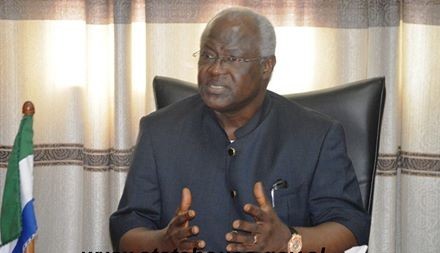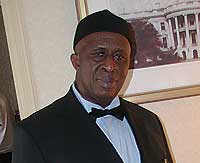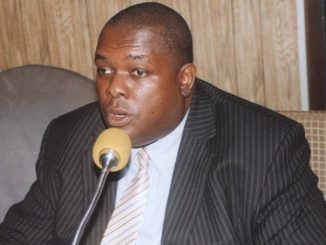
BY KABS KANU :
When President Ernest Koroma highlighted this problem now being propounded here by the WHO , he was not trying to blame the people wholly for the Ebola outbreak or the increasing spread of the disease, as some of his critics wrongly interpreted . He was only highlighting an indisputable fact that all Sierra Leoneans must accept and adhere to strictly to enable us to break the chain of transmission of the virus—WE MUST CHANGE OUR ATTITUDES AND REFRAIN FROM PRACTICES THAT HELP TO SPREAD THE DISEASE.
President Koroma is the President of Sierra Leone .He is also the Father of the nation. He is the man in charge. He is full of sympathy for what his people are undergoing and when you look at the President these days you see from his facial expressions and body language that he is carrying on his shoulders all the burdens , empathy, sympathy and sorrows of what has befallen the nation. You also see in him, though, the resolve, determination and commitment of the nation to defeat the Ebola virus. God will bless his efforts and the tremendous work being done by one and all to take us out of this scourge .
However, as the President of the nation , Ernest Koroma reserves the right to speak out about some of the factors that are making the Ebola fight very difficult–The non-compliance with protocols and precautions by a significant number of people . It does not mean that he is passing the buck to the people and blaming them for the disease. Anybody who knows and understands President Koroma well knows that he does not have a penchant for blame games. He is a hands-on President and a mover and motivator of national resolve and action. He spend more time working than blaming people . He was just highlighting a gap in the Ebola fight that Sierra Leoneans need to correct if we must get the disease out of the country.
The same frontline operators that are hailing the dramatic reduction of Ebola cases in neighbouring Liberia and who understand why Liberia is succeeding are continuing to diagnose why the same is not being said of Sierra Leone yet– Dangerous traditions and harmful practices that are making it difficult to break the chain of transmission . We must continue to prevail on our brothers, sisters, fathers., mothers, aunts, uncles, cousins, neighbours, townmates and friends and countrymen and women to suspend these traditions and practices for a while so Ebola can be kicked out of Sierra Leone . We must sensitize our people to obey the protocols and precautions. BLINDLY DEFENDING THEM IN THEIR DISOBEDIENCE AND NON-COMPLIANCE IS NOT LOVE AT ALL.
WE must help them face the truth and change their attitudes. Nothing done will make a difference if we the people do not stop the chain of transmission through traditional practices.
READ WHAT FRONTLINE OPERATORS ARE ALSO SAYING :
Shock treatment: what’s missing from Sierra Leone’s Ebola response
By Tom Miles
GENEVA (Reuters) – The failure of Sierra Leone’s strategy for fighting Ebola may be down to a missing ingredient: a big shock that could change people’s behavior and finally prevent further infection.
Bruce Aylward, the head of Ebola response at the World Health Organisation, said Sierra Leone was well placed to contain the disease — its worst outbreak on record — with infrastructure, organization and aid.
The problem is that its people have yet to be shocked out of behavior that is helping the disease to spread, still keeping infected loved ones close and touching the bodies of the dead.
“Every new place that gets infected goes through that same terrible learning curve where a lot of people have to die … before those behaviors start to change,” Aylward told Reuters.
While neighboring Liberia has turned the tide of Ebola, and both Mali and Nigeria quickly smothered outbreaks, Sierra Leone has more than 70 percent of cases reported in the past three weeks and more than half the 18,000 confirmed cases in the nine-month-old outbreak.
The WHO’s death toll from outbreak has climbed to 6,583 but the actual figure is likely to be far higher due to under-reporting of cases.
The flare-up in Sierra Leone’s capital Freetown and the country’s more heavily populated western areas resemble the massive infections suffered in August by Liberia’s capital Monrovia.
That country got its infection rates under control after panic in quarantined areas led to a riot and the shooting of a young boy by security forces. Scenes of people dying in the street raised alarm across the country and prompted a military deployment by the United States to build treatment centers.
“In Monrovia you had bodies on the streets, you had a riot, you had someone shot – awareness went through the roof in a very, very short time as a result,” said Aylward.
“You don’t want to see that kind of thing drive public awareness but it has an impact very, very fast. People changed behaviors in Monrovia – bang! Like that.”
Mali also learned through a shock. Just as it seemed nobody had been infected by its first Ebola patient in October, another cluster of deaths sprang up the following month. Aylward said he told Malian officials that the only way to stop the outbreak was to trace anyone who may be at risk.
“That’s when the contact tracing… took a jump from around 60-70 percent completion to 98 percent,” he said.
LEARNING CURVE
Denial and ignorance are part of the problem but a weak healthcare system and logistics also play a part. Officials in Kono – where an explosion of infections was discovered this week – said the eastern district of 350,000 inhabitants had only one ambulance and no Ebola treatment center.
WHO staff are visiting neighboring West African countries to try to get people to change their ways in case Ebola strikes, but worry there has been little change in remote border areas, Aylward said.
“The forest area of these three countries has got some really special and concerning practices, where they share meals with the corpse, where they sleep with the corpse,” he said.
“You know these are high, high risk behaviors.”
In Sierra Leone, where as many as 365 Ebola deaths may have been linked to a single traditional funeral early in the epidemic, Sierra Leone’s Health Minister Abu Bakarr Fofanah said the government was considering banning some unsafe practices.
He recognized however that it would be difficult to police such a law.
Fofanah noted that some areas of eastern Sierra Leone that were hit hardest early in the epidemic — around the towns of Kenema and Kailahun — have seen a massive reduction in case numbers as people change behavior.
“The areas that are now doing badly are the areas that were affected last. They are still on the learning curve.”
(Editing by Daniel Flynn and Sophie Walker)
Dangerous practices spread Ebola in Sierra Leone
KAMPALA, Uganda — Dr. Michael Mawanda saw some disturbing behaviors when he was in Sierra Leone helping fight the Ebola epidemic, including relatives removing patients from the hospital where he worked.
The family members who removed the Ebola patients couldn’t bear to be separated from their loved ones, but their actions made it nearly impossible for health workers to track new Ebola infections and risked spreading the virus further, said Mawanda, who despite taking precautions came down with Ebola himself and barely survived.
The Ebola outbreak, which is stabilizing in Liberia and Guinea, is spreading fastest in Sierra Leone. In a recent 21-day period, Guinea had 306 new Ebola cases. Liberia had 278. Sierra
Leone had 1,455, according to the World Health Organization.
Mawanda believes that clinging to dangerous practices is the reason why. So does Sierra Leone President Ernest Bai Koroma, who on Tuesday urged Sierra Leoneans to desist from washing of corpses, from secretly burying the dead at night instead of calling for Ebola burial teams and any from other practices that could accelerate infections.
“Naturally what happens is that as more and more people get infected, people learn lessons. Unfortunately, that takes a long time,” Mawanda, a 38-year-old Ugandan physician, said in an interview with The Associated Press.
Unsafe burials are believed responsible for 70 percent of new infections in Sierra Leone, Chief Medical Officer Dr. Brima Kargbo told reporters Wednesday. The bodies of people who have died from Ebola are particularly contagious and must be handled carefully, but throughout the region, many people continue to bury their dead using traditional methods, including washing and touching the body. Ebola is spread through contact with bodily fluids of an infected person or corpse.
Mawanda said sensitization campaigns have not been widely successful in West Africa largely because many locals seem unwilling to break with age-old customs such as
 © AP Photo/Michael Duff, File FILE – In this Saturday, Sept. 20, 2014 file photo, a health worker volunteer marks a home with chalk to identify that it has been visited, as they distribute bars of soap and information about Ebola in Freetown, Sierra…
© AP Photo/Michael Duff, File FILE – In this Saturday, Sept. 20, 2014 file photo, a health worker volunteer marks a home with chalk to identify that it has been visited, as they distribute bars of soap and information about Ebola in Freetown, Sierra…






Leave a Reply